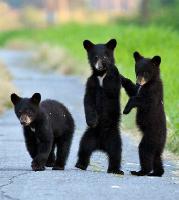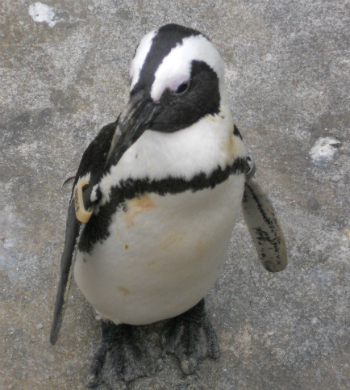|
Dear friend,
As we welcome the change of seasons, we reflect upon the busy summer, a record-breaker for Wild ARC. By the end of August, 1,983 wild animals had been admitted – 369 more animals than recorded on August 31 of the previous year! We are on pace to receive almost 2,500 wildlife in 2013, 20% more than we have ever treated in one year.
We also celebrated another milestone this summer, finally being hooked up to municipal water. This will dramatically decrease our water costs and provide us with much needed fire protection. With the increasing need for our rehabilitation services, it couldn’t have come at a better time.
On a personal note, I was lucky enough to visit our wildlife rehabilitation colleagues at SANCCOB in Cape Town, South Africa this past July. We are so saddened to hear about a recent spill off their coastline affecting hundreds of endangered Africa Penguins. Like us, they do not receive government funding for their rehabilitation efforts and have struggled with mounting water costs. It is a stark reminder of what could happen here in BC to our coastline, if we do not work to protect our wildlife.
With appreciation,

Sara Dubois
Manager, Wildlife Services
PS. You can multiply your impact! Forward this message to friends, family and colleagues.

Four baby Barn Owls evicted from their nest find refuge at Wild ARC
 Disturbing an active bird nest with young is illegal – however, this summer a special exception was made and a permit was issued, to allow four baby Barn Owls facing eviction to find refuge at Wild ARC. Although it meant the young birds would have to be raised in captivity, it was their best hope for their survival. Disturbing an active bird nest with young is illegal – however, this summer a special exception was made and a permit was issued, to allow four baby Barn Owls facing eviction to find refuge at Wild ARC. Although it meant the young birds would have to be raised in captivity, it was their best hope for their survival.
Only a few weeks old, the birds would have be to hand-fed hourly for weeks until they were capable of feeding on their own. Gradually, once learning what prey items to look for, they were challenged to hunt on their own – a skill they would have to prove in order to be fit for release.
Now banded for monitoring purposes, the four will be released shortly in an agricultural area away from the city. A nest box will be installed in a private barn surrounded with fields. Unfortunately, Barn Owls are under threat due to the loss of suitable habitat and pesticides affecting their prey.
Photo credit: Christina Carrieres, Senior Wildlife Rehabilitator
More...

Bear-ly coping
 With fall fast approaching, black bears are beginning to fatten up in preparation for hibernation and human foods are an attractive option. With fall fast approaching, black bears are beginning to fatten up in preparation for hibernation and human foods are an attractive option.
The problem? There is always potential for conflict whenever bears are drawn into urban areas. In some cases, the management response is translocation; to move the “problem” bear to a new location, away from the site of conflict. But life for a translocated bear is difficult, not to mention dangerous.
Is translocation the answer to human-bear conflicts, or just another case of “out of sight, out of mind”?
More...

Hunting shows on weekend morning television dropped from Global TV line-up
 Although the BC SPCA supports ethical and subsistence hunting, we oppose hunting for trophy or sport, especially when such hunting involves inhumane practices like bow hunting. Recently, the BC SPCA learned that several hunting television programs, some which we had received cruelty complaints about, were to be cancelled from weekend morning programming of Global TV, an affiliate of Shaw Media. Although the BC SPCA supports ethical and subsistence hunting, we oppose hunting for trophy or sport, especially when such hunting involves inhumane practices like bow hunting. Recently, the BC SPCA learned that several hunting television programs, some which we had received cruelty complaints about, were to be cancelled from weekend morning programming of Global TV, an affiliate of Shaw Media.
Hunters are now up in arms over this recent announcement with petitions and Facebook campaigns demanding Global TV and Shaw Media to reverse the decision. However, the television network defends that the decision was not made to please any anti-group.
“(The cancellations) were not due to viewer complaints or a hunting bias, concerns around violence or the quality of the production, but was based on the goal of broadening the appeal of our daytime programming and increasing viewership,” says Shaw spokesman Dervla Kelly. (Edmonton Sun, Sept 24)
We applaud Global Media’s decision and encourage you to let them know what you think too: viewercontact@globaltv.com.
Read the BC SPCA’s position statement on hunting and other wildlife issues.
Photo credit: Jeremy Leete

Recent oil spill in South Africa reminds us it can happen here
 As our colleagues in Cape Town work around the clock to treat almost 200 oiled African Penguins, we are reminded how easily we could be in this situation or worse. British Columbia has no designated facilities for oiled wildlife housing and rehabilitation, inadequate equipment for wildlife capture and treatment, and few professionally-trained personnel that are prepared to respond to an oiled wildlife emergency. As our colleagues in Cape Town work around the clock to treat almost 200 oiled African Penguins, we are reminded how easily we could be in this situation or worse. British Columbia has no designated facilities for oiled wildlife housing and rehabilitation, inadequate equipment for wildlife capture and treatment, and few professionally-trained personnel that are prepared to respond to an oiled wildlife emergency.
Currently, all general wildlife rehabilitation centres operate at full capacity without any government funding for oiled wildlife response, and none have the ability to mount a response to a major or even minor oiled wildlife event. There is no designated funding for oiled wildlife response activities in BC; unless a spiller voluntarily opts to pay, government and industry quibble over cost issues while oiled wildlife are left in the field.
Recently, the BC SPCA and other provincial wildlife rehabilitation non-profit organizations contributed to a report on the Status of Oiled Wildlife Preparedness (PDF) which has been submitted by Living Oceans as evidence to the National Energy Board in their review of the Enbridge Northern Gateway Project. Limited training opportunities for oiled wildlife response are available; get involved with the Oiled Wildlife Society of BC to find out more.
Photo credit: Sara Dubois, Image taken at SANCCOB July 2012

Two great events benefitting wildlife this summer wrap-up
 A huge THANK YOU to all our supporters and to Jamieson Vitamins for hosting the Call for the Wild Contest which ended last week. Wild ARC came out on top with a whopping $38,930! These funds will go directly to provide care for our increasing number of patients. A huge THANK YOU to all our supporters and to Jamieson Vitamins for hosting the Call for the Wild Contest which ended last week. Wild ARC came out on top with a whopping $38,930! These funds will go directly to provide care for our increasing number of patients.
Also a big thanks goes to everyone that entered our 4th annual Wildlife-In-Focus Photo Contest which ends on Sept 30. Judging will take place in October and winners will be announced and posted by November. These images grace the pages of our publications and educational materials and help spread our humane wildlife messaging. You’ll even find the contest images used in this e-newsletter.
We are so grateful to our supporters for taking the time to submit your votes and amazing images this summer.

The films are in! Online viewing and screening in Victoria coming soon…

The Paws and Claws Film Festival submissions close this week and a selection of films will be prepared for viewing in October.
If you live near Victoria, or need a good excuse to visit, you’ll have chance to view the selections in person at a Sunday matinee screening at The Vic Theatre on October 21 at 2pm.
Everyone else will have an opportunity to view the selections online over a week’s period mid-October. Winners for “The People’s Choice” and “Judges’ Choice” awards will be announced at the silent auction dinner on Saturday November 4th at the beautiful CFB Esquimalt Wardroom.
Tickets to either event in Victoria are now available.
More...

WILDLIFE TIP – Deterring uninvited house guests
 With fall in the air, wild creatures will be looking for warm dry places to spend the winter. To keep the critters out of attics, crawl spaces and out-buildings, now is the time to wildlife-proof your home. With fall in the air, wild creatures will be looking for warm dry places to spend the winter. To keep the critters out of attics, crawl spaces and out-buildings, now is the time to wildlife-proof your home.
Wire mesh over attic vents and chimney openings keeps squirrels, raccoons and roof rats from getting inside. Fill smaller holes and cracks with steel wool or wire mesh and seal with expanding foam. A new line of insulating foam contains a bittering agent said to humanely deter insects and rodents from chewing through.
Similarly, outbuildings require skirting of either wood or wire to prevent larger animals, including coyotes, from choosing a shed as a winter home. Wire should go below ground level as persistent animals will excavate under or around obstacles. Always check to make sure there are no animals trapped inside before you seal any openings.
Photo credit: Rick Mintz
|